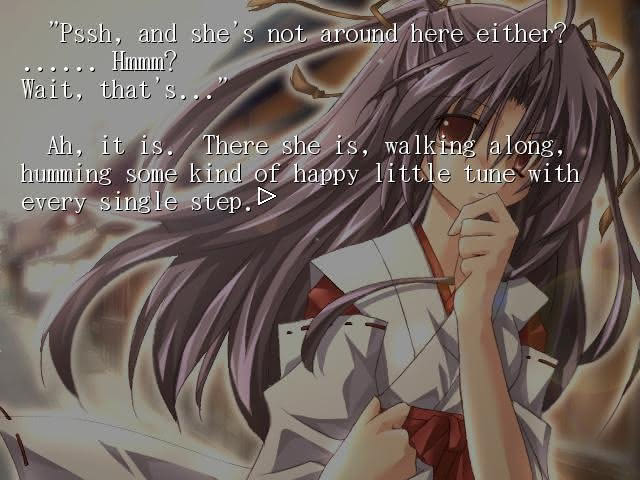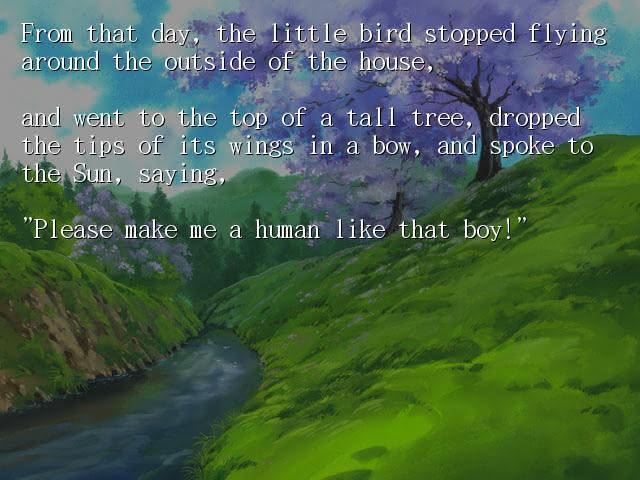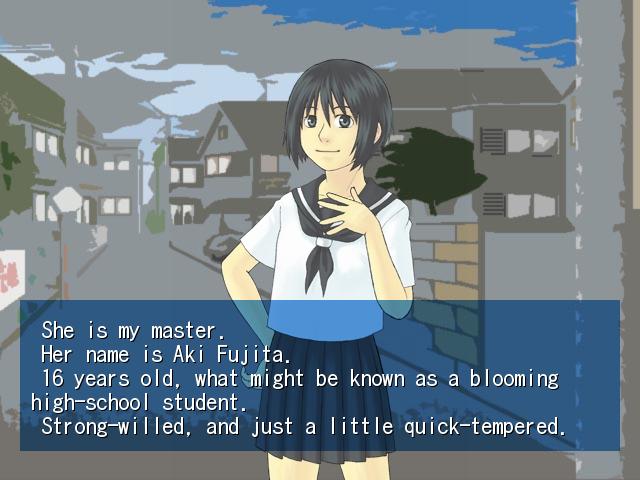31 Japanese doujin visual novels were translated into English and contributed to three translation festivals – al|together – which took place in 2005, 2006, and 2008. Here at The New Leaf Journal, I undertook a project to review nearly all of these novels individually, and I ultimately wrote full articles on 29 of the 31 translations.
You can learn more about my al|together project by reading my project introduction article. That article includes a running list of our completed al|together reviews. I have a dedicated collection post with links to all of our al|together articles, including reviews, essays, and short posts.
I recently decided that a fun way to celebrate the completion of my multi-year project would be to rank the al|together novels. This article is the first of three legs of the ranking and will cover the bottom third of the ranking, novels that place 31to 21 on my list. If you have not done so already, I recommend reading my brief al|together ranking introduction before beginning with my ranking.
Although I only reviewed 29 out of the 31 novels, I will include all 31 on my list. Because this is the first leg of my ranking and we are going in reverse order, all of the novels are on the board. See the full list below, sorted in alphabetical order within their respective festival years:
- al|together 2005: A Midsummer Day’s Resonance; A Winter’s Tale; io [Christmas Eve]; I, Too, Saw Dreams Through Air; Narcissu; Plain Song; Plain Song Christmas Special; The Poor Little Bird; Until We Meet Again
- al|together 2006: Adagio; A Dream of Summer; At Summer’s End; Collage; Flood of Tears; Instant Death! Panda Samurai; Midsummer Haze; My Black Cat; Night of the Forget-Me-Nots; OMGWTFOTL; Red Shift; Shooting Star Hill; Summer, Cicadas, and the Girl; The world to reverse.; Visions From the Other Side; Wanderers in the Sky
- al|together 2008: Crimsoness; From the Bottom of the Heart; LEAVEs.; May Sky; Moonshine; The Letter
Without further ado, I present al|together novels 31-21.
al|together Novel Ranking: 31-21
Note that for each novel in the ranking, I will include its ranking for its al|together year and its length-tier ranking. The length tier ranking shows how the novel in question compares against al|together novels of similar lengths. I explained the length tiers in the introduction. In general, the very short tier is for novels that take less than 20 minutes, the medium-short tier is for novels in the 20-50 minute range, medium short covers novels from 50 minutes to 2 hours, and long covers novels that generally take more than 2 hours.
31. Midsummer Haze
The novel to appear at the bottom of my ranking should be no major surprise to readers who followed my al|together series. Midsummer Haze highlights the danger of clever visual novel mechanics – the chance that your mechanic may be broken.
- al|together 2006 rank: 16/16
- Medium-Short rank: 8/8
In theory, Midsummer Haze should be in length tier 3 for novels that are under 20 minutes. However, thanks to the infuriating mechanic I referenced at the top, Midsummer Haze will almost always take more than 20 minutes to complete.
Novel Info
- Short Summary: A schoolgirl goes to school and hangs out with her two best friends on a hot midsummer day, but her friends seem to be acting a little bit strangely.
- Festival Page: al|together 2006
- Translator: Kyuuen
- Japanese Novel: Manatsu no Kagerou (2004)
- Original Developer: Sakura Shima
- Engine: KiriKiri 2 / KAG 3
- VNDB Entry
- My Midsummer Haze Review
Discussion
Midsummer Haze has four endings. Achieving the third ending, and by extension the fourth ending, requires triggering a random event that has a small chance of occurring while playing through one of the first two endings. All I need to say to justify Midsummer Haze’s 31st place placement is that it took me 43 tries to trigger the third ending on my first run and 19, 30, and 28 tries on three subsequent attempts wherein I was testing exactly how absurd the mechanic was.
Midsummer Haze is a pedestrian doujin visual novel apart from its random trigger mechanic. Had it employed a sane trick for unlocking the third ending, it may have found itself in position 27-or-so instead of dead last. (While I do not think that would have been possible to justify making me do the same thing 43 consecutive times to unlock the second half of the novel, Midsummer Haze never threatened to challenge my assum.)
The random trigger mechanic was so absurd that it ended up being more memorable than the long, complicated series of steps I undertook to even be able to play Midsummer Haze, which is without question the most elusive of the al|together pieces.
30. LEAVEs.
LEAVEs is the first of two al|together novels that I did not review for content-based reasons, namely that we are a family website. But as I will explain below, it is not the few instances of non-family friendliness alone that landed it close to the bottom of the ranking.
- al|together 2008 rank: 6/6
- Long rank: 7/7
LEAVEs. is either the second or third longest novel of al|together, battling Collage and only clearly behind May Sky. It stands out in that it ranks well below the other 7 length tier 1 novels – none of the other 7 will appear in this first installment of the al|together ranking.
Novel Info
- Short Summary: See discussion below.
- Festival Page: al|together 2008
- Translator: Seung Park
- Japanese Novel: LEAVEs. (2005)
- Original Developer: BEKKO.NET
- Engine: NScripter (JP); ONScripter (EN)
- VNDB Entry
Discussion
The main character, Tomohiro Higuchi, is a young man with some anger issues who wallows in self-pity due to his having been an orphan and feeling like no one understands him. He has a friends with benefits (albeit without much friend) relationship with his childhood friend, Touka Ichimura, who has taken up prostitution to earn money for her other vices and is rapidly spiraling toward irrevocable self-destruction. There’s a third childhood friend, Matsuri Hikiyama, who, unlike Higuchi and Touka, is a good student and well put together. However, she is single-mindedly in love with Higuchi for some unknown reason and ends up being even more insufferable than he is.
Of the four main characters (I cannot reveal the fourth in a spoiler-free setting), the only one who is sympathetic at all is the worst-off, Touka. While Touka is the personification of a train-wreck, she is not a bad person at heart. She desperately needs someone she can rely on. Unfortunately for her, she has no one to turn to other than the Higuchi, who is too self-involved to do anything more than push Touka closer and closer to the edge through his unwillingness to take responsibility for anything in his life.
(Did I mention Higuchi is the second most pleasant character of the cast?)
The novel is a slog. It briefly shows signs of somewhat redeeming itself and Higuchi (granting that redeeming Higuchi may be an impossible task by that stage) at the end before descending into a bout of genre logic followed by dousing itself in gasoline and lighting itself on fire in an epilogue that would have featured the most ill-conceived plot decision of al|together if not for the one that immediately preceded it. This is a case where being long (by al|together standards) did not help LEAVEs’ cause.
29. Wanderers in the Sky
I broke a long al|together review drought with Wanderers in the Sky back in November 2022. The novel is well-intentioned, but as its ranking two spots from the bottom of my list indicates, I had some issues with the end-product.
- al|together 2006 rank: 15/16
- Short rank: 8/8
Wanderers in the Sky is a borderline tier 4 length novel – in that it could take more than 20 ??minutes to read. But I think it slots into tier 4 well enough.
Novel Info
- Short Summary: An amnesiac protagonist who feels like he is forgetting something important wakes up in a cave and then meets a mysterious woman.
- Festival Page: al|together 2006
- Translator: Zalas
- Japanese Novel: Sora no Mayoibito (2005)
- Original Developer: Nokka~
- Engine: NScripter (JP); ONScripter (EN)
- VNDB Entry
- My Wanderers in the Sky Review
Discussion
Wanderers in the Sky is a visual novel about accepting loss and moving forward. There are some decent takes on this common theme in the al|together set, including at least one that is close in length to Wanderers. However, despite Wanderers having good intentions, it falls well short of adequate execution.
The story begins when the amnesiac view point protagonist meets a mysterious girl in a quiet, mysterious place. There are no signs of story trouble in their cryptic dialogue. However, in the second half of the very short story we follow the protagonist to a cave where he began the story before meeting the mysterious woman. There we are introduced to three new characters in rapid succession, each of whom seems to know the protagonist. Provided the protagonist makes a series of correct survive and advance choices, the reader is whisked to the novel’s happy true ending where the protagonist and other characters we barely know live happily ever after.
Had Wanderers been longer or more focused in its short run-time, it could have been passable. But I came away with the distinct impression that there was at one time a longer story planned before Wanderers was cut down in length without meaningfully adjusting the story. Another issue that seals Wanderers’ ranking fate is that it has nothing to fall back on – neither its visuals, music, nor overall presentation stand out by the modest standards of doujin Japanese visual novels of the era.
28. Adagio
Adagio is one of the shortest al|together pieces, amenable to being read to completion within five minutes.
- al|together 2006 rank: 14/16
- Short rank: 7/8
Adagio is the first of three novels by circle 17 to appear on our list – but that is bad news for Adagio since this list is going in reverse order.
Novel Info
- Short Summary: A young pianist is entranced by a dancer from a traveling troupe (probably).
- Festival Page: al|together 2006
- Translator: Irene Ying
- Japanese Novel: Adagio
- Original Developer: 17
- Engine: NScripter (JP); ONScripter (EN)
- VNDB Entry
- My Adagio Review
Discussion
Some al|together novels have a strong hook, something that inspires discussion. For example, I had plenty to say (not entirely positive) about the three novels I discussed above. Conversely, Adagio inspires no strong feelings in me. As I noted in my review, I wondered whether I missed something when I first read it, so I read it again and concluded that I had not missed much. It has pretty (albeit too dark) painted backgrounds and its single piece of background music is nice, but Adagio fails to use its 3-5 minute read time to leave much of an impression beyond huh. It escapes the very bottom of the ranking principally because I would rather be nonplussed for a couple of minutes than have to (1) do the same thing 43 consecutive times, (2) go through LEAVEs, or (3) recover from the whiplash of Wanderer’s ending.
While I do not think Adagio was a strong piece, I note in full fairness to developer 17 that it was the circle’s first piece, and the first of its three pieces to appear in al|together. That neither of their subsequent pieces appears in this first installment of the ranking should be viewed as a sign that I think 17 improved in its subsequent efforts.
27. Instant Death! Panda Samurai
The answer to the following question: “What is the only al|together visual novel to conclude with a multi-choice quiz game?”
- al|together 2006 rank: 13/16
- Very short rank: 6/8
While many of the al|together novels draw clear inspiration from well-known visual novels of the day, Instant Death! Panda Samurai is truly a one of a kind. Is that for better or worse? Well…
Novel Info
- Short Summary: A down-on-his-luck panda samurai struggles to pay rent before encountering his great rival.
- Festival Page: al|together 2006
- Translator: Erik Sjoberg
- Japanese Novel: Hissatsu Panda Samurai (2003)
- Original Developer: KEN and Beniiro
- Engine: NScripter (JP); ONScripter (EN)
- VNDB Entry
- My Insant Death! Panda Samurai Review
Discussion
Starting with the good – Panda Samurai has a genuinely unique art style and user interface that stands out from other al|together pieces and, without more, it is worth the price of admission. It also has what may be the most detailed post-game developer commentary wherein the two developers present a conversation about making Panda Samurai in visual novel form. As I noted above – it is certainly the only al|together novel to end with a samurai fight in the form of a quiz game. One can also see that the translators at Insani had fun with the project.
I wanted to like Panda Samurai, and I appreciate the work that went into it. But the final product is weird for the sake of being weird – an affliction that is not unique in this first leg of the al|together ranking. While the quiz game was creative, I found myself wondering why I was engaged in samurai combat via a quiz game. Panda Samurai wants to be loved, but it lacks substance – even in the absurd comedy sense.
26. OMGWTFOTL
We now reach the second novel with an 18+ rating advisory that I did not review (because we are a family website). However, OMGWTFOTL’s issues are much tamer than LEAVEs’, and I almost talked myself into a review – but I decided there was nothing much I could say in an unplanned article that I could not say in my final assessment.
- al|together 2006 rank: 12/16
- Medium-Short rank: 7/8
It describes itself as a “lunatic novel game” and that is more or less over the target.
Novel Info
- Short Summary: Genuflect or die.
- Festival Page: al|together 2006
- Translator: Nanatuha
- Japanese Novel: Otoko Dogeza Jigoku (2006)
- Original Developer: Hanpamania-Soft
- Engine: NScripter (JP); ONScripter (EN)
- VNDB Entry
Discussion
OMGWTFOTL is certainly something. It defies easy explanation, but the player takes the role of some young man protagonist who is facing off against some over-muscled lunatic who did unsavory things to a couple of people important to the protagonist. Every scene is punctuated by a choice – with one option always being to genuflect. Unsurprisingly, genuflecting generally does not lead to a positive outcome (granted not genuflecting also leads to many bad outcomes). As for the outcomes, there’s death, love, storming a military base, or a rom-com that has nothing to do with any of this. There is only one al|together novel that is arguably weirder than OMGWTFOTL – and it is (surprisingly) not Panda Samurai. But similarly to Panda Samurai, OMGWTFOTL has a unique look. In this case, every background is effectively a CG scene and there are a great number of them, making this one of the better visual efforts of al|together.
OMGWTFTOL is the most interactive al|together novel in terms of the amount of choices for its length. It has a large number of endings. While the number of choices and endings are impressive, one point I found odd (and slightly frustrating) was that many choices loop back to the beginning. It would have made sense to add more bad endings. But with that being said – it does not take long to find all the endings.
The humor in OMGWTFOTL is often in poor taste and neither the original developer nor Insani hide that (hence the warnings it comes with). One’s milage with OMGWTFOTL will largely turn on whether he or she find its jokes funny and appreciate its frenetic randomness. As you can infer from my 26th place ranking – I was not the intended audience – and I say this as someone who (as you will see) ranked the similarly random and only in slightly better taste Crimsoness from al|together 2008 quite a bit higher. In addition to finding it more weird than funny, the choice structure was more irritating than creative.
However, I begrudgingly give it the nod over the similarly random and much more wholesome Panda Samurai because it was occasionally funny. Without spoiling, I did appreciate the single “good” end of OMGWTFOTL as being so absurdly random and disconnected from everything else in the novel that I could not help but silently applaud.
25. io [Christmas Eve]
Now for the only al|together piece to borrow its background music soundtrack from Beethoven.
- al|together 2005 rank: 9/9
- Medium-Long rank: 8/8
In addition to its unique soundtrack, io [Christmas Eve] is also one of only two al|together translations to be a patch for the original Japanese game. Alas, the other was Midsummer Haze, so the patches did not fare well in my ranking.
Novel Info
- Short Summary: Two loafers decide to cut class and camp in an igloo; They meet a younger girl who hangs out with them.
- Festival Page: al|together 2005
- Translator: Zalas
- Japanese Novel: io [Christmas Eve] (2005)
- Original Developer: Esuhara
- Engine: KiriKiri 3 / KAG 2
- VNDB Entry
- My io [Christmas Eve] Review
Discussion
io [Christmas Eve] makes for pleasant reading in its first half. The main duo, two loafer school friends, are strangely entertaining as they cut class to hang out in an igloo, eventually making an elementary school-aged friend (who, unsurprisingly, is the real protagonist). But the novel goes from being charming to somewhat grating as one waits for something to change or happen while the novel reluctantly stays the course until finally making a late (vaguely foreshadowed) jarring shift that leaves the reader with a sour taste. Another writing issue that pops up is that none of the three main characters are well-defined or particularly interesting, and the two with the biggest speaking roles are often hard to tell apart in their dialogue. In addition to io’s odd pacing, its production values from character designs to backgrounds and UI elements are uninspiring – even by the standards of the small doujin pieces translated for al|together – and they are certainly the weakest of the small set of al|together novels written in KiriKiri. However, io’s unusual choice to use Beethoven for the majority of its sound track works surprisingly well.
24. Visions from the Other Side
I will admit that I am still not entirely sure what Visions From the Other Side is actually about.
- al|together 2006 rank: 11/16
- Medium-Short rank: 6/8
We have a miko who committed suicide, her psychotic sister, a fish man, and more.
Novel Info
- Short Summary: A miko throws herself off a cliff after tiring of her sister’s “experiments,” we meet her ghost, her sister, a fish man, and some other interesting characters.
- Festival Page: al|together 2006
- Translator: Edward Keyes
- Japanese Novel: Mukou no Yume (2002)
- Original Developer: Treasures
- Engine: NScripter (JP); ONScripter (EN)
- VNDB Entry
- My Visions from the Other Side Review
Discussion
Visions From the Other Side is the most ambitious novel we have seen thus far outside of LEAVEs. It features four narrators, different time periods, dark themes, and humor. Its principal protagonist, a miko who throws herself off a cliff in the novel’s opening scene, has a strong voice. Moreover, Visions is on the high end of production values, with a varied soundtrack and above average character sprites and CGs.
Visions has enough positive qualities to suggest a higher ranking, but it falls into the trap of being weird for the sake of being weird. Its characters are strange, and it is disinclined to fully show its hand in its relatively short run. The stories converge into an unsatisfying ending. Like Adagio, I had to reread it at least once to try to put everything together – which would have been good had there been more to put together.
Visions gets a boost for its strong production values and delivering some individually good scenes and well-written moments. Hiwever, and similar to Wanderers in the Sky below it in this ranking, I came away thinking it either needed to be longer or less ambitious.
(I recommend reading these interesting 2006 articles by translator Ed Keyes and supervisor Seung Park on the translation effort.)
23. The Poor Little Bird
Although this short “digital picture book” was not the first al|together novel I played (noting I played a few of them back in 2010-11), it is the first I reviewed here at The New Leaf Journal.
- al|together 2005 rank: 8/9
- Very Short rank: 5/8
The Poor Little Bird is one of three visual novels created by Eno Yamamoto Ten to be part of al|together. Interestingly, it is the last of his three novels. His first two will have to wait for one of the next ranking articles.
Novel Info
- Short Summary: A pet songbird misunderstands why the boy who owned him left and it goes on a journey in search of answers.
- Festival Page: al|together 2005
- Translator: Edward Keyes
- Japanese Novel: Kawaisou na Kotori (2002)
- Original Developer: Eno Yamamoto Ten
- Engine NScripter (JP); ONScripter (EN)
- VNDB Entry
- My The Poor Little Bird Review
Discussion
The Poor Little Bird is one of the simpler al|together pieces, featuring less than 10 minutes of reading with no choices and relying on pretty backgrounds for its visuals. The author, Eno Yamamoto Ten, accurately described it as a “digital picture book.” It is packaged as a short moral (perhaps cautionary) story in which the author poses a specific question for readers.
I wanted to like The Poor Little Bird because I think that using the sound novel medium to produce a “digital picture book” with a little moral is a clever idea. Unfortunately, the story trips over itself. The protagonist, the poor little bird, goes on a journey triggered by certain plot conveniences and charges into misfortune on account of his relentless stubbornness. This combination ultimately muddles the conclusion of The Poor Little Bird to the extent that the question the author poses is not the first question that will likely to come to mind for most readers. Here we have a good and creative idea that is undermined by its script. However, I still recommend it because of its short length and interesting concept.
22. Night of the Forget-Me-Nots
Night of the Forget-Me-Nots is a horror visual novel with many choices and a lengthy list of endings to collect.
- al|together 2006 rank: 10/16
- Medium-Long rank: 7/8
Unsurprisingly given the fact that it is a horror novel – Forget-Me-Nots is the only al|together piece with designs on jump scares.
Novel Info
- Short Summary: A girl and a boy get separated from their class on an overnight school trip and find themselves over night. in an apparently haunted (and often deadly) abandoned school building
- Festival Page: al|together 2006
- Translator: Ein Ni Hen
- Japanese Novel: Wasurenagusa no Yoru (2003)
- Original Developer: Jewel Box
- Engine: NScripter (JP); ONScripter (EN)
- VNDB Entry
- My Night of the Forget-Me-Nots Review
Discussion
Night of the Forget-Me-Nots has one focus: Being a multi-path horror novel with all the horror tropes and some valiant attempts at jump scares. While there is a story, it is nothing to write home about and neither of the main characters have much personality at all. It relies on stock images for backgrounds (good selections) while muddling its excellent jump scare sound effects with some odd music choices (best played without music). Of all the novels in the bottom leg of the ranking – I had the most issues with how it reads for a variety of reasons I noted in my review.
But granting its flaws, Forget-Me-Nots fulfills its mission of being a fun little horror novel. The choice structure is surprisingly well thought out and it managed to pack an impressive number of materially distinct endings into a short novel. I enjoyed trying different choices to complete the ending index, which is helpfully included as a title screen menu item. To the extent that Night of the Forget-Me-Nots aspires to be a fun way to spend 60-90 minutes, it is a success. But the shortcomings of its script relegate it to the bottom third of our ranking.
21. My Black Cat
The first leg of my al|together novel has already featured videos put the player in the perspective of a panda, fish-man, and unfortunate bird. I suppose that it is only fitting that we end with the al|together novel where the player is a cat.
- al|together 2006 rank: 9/16
- Medium-Short rank: 5/8
Like Night of the Forget-Me-Nots one spot behind, My Black Cat features choices leading to multiple endings, but with fewer choices and a simpler structure.
Novel Info
- Short Summary: The story of a talking pet cat, seen from the perspective of said cat, and his master, who is the only person who can understand him.
- Festival Page: al|together 2006
- Translator: Ben Carter
- Japanese Novel: Watashi no Kuroneko
- Original Developer: Natukusa
- Engine: NScripter (JP); ONScripter (EN)
- VNDB Page
- My My Black Cat Review
Discussion
My Black Cat is built around its three similar-but-meaningfully-distinct endings and the choices (seven in all) that the player must make to reach them. Like many visual novels, it makes a play for the reader’s emotions, here highlighting the relationship between a girl and her pet (where the player is surprisingly the pet instead of the girl). While it it does not have the sharpest production values of al|together, I appreciated its realism-inclined character art style and stylized backgrounds.
I appreciate what My Black Cat went for and for the most part, the author accomplished what he set out to do with building a simple story that leads to the three endings he wanted to share. There is nothing wrong with My Black Cat, but its ranking reflects the fact that it, like some other pieces in the 31-21 ranking set, feels more like a novel that was created to implement an idea than a meaningful story. Like Wanderers (granting My Black Cat is a much better finished product than Wanderers), we do not spend enough time with the characters to give the novel’s endings the sort of emotional impact that the author may have hoped for. With that being said, it is an interesting project that is worth reading for fans of the medium.
Final Thoughts on Review Part 1
One reason I decided to include length-tier rankings for each novel is because my list has a distinct bias in favor of longer al|together pieces. Only 3 of the bottom 11 novels are from my “long” and “medium-long” tiers, with the other eight spots going to novels from the shorter tiers. There are a few shorter novels that earned high rankings, but in my evaluation at least, the longer tiers are favored at the high end.
Eight of the bottom eleven novels are from al|together 2006, with only one coming from 2008 and two from 2005. This, however, is no indictment of the 2006 festival since it accounted for more than half of all of the al|together novels.
Starting a 24th, we see novels that were not too far off from moving up one tier. Visions From the Other Side needed to either be longer or focused more on its main (and most interesting) character instead of jumping around, The Poor Little Bird needed to avoid muddling its message, Night of the Forget-Me-Nots could have moved up with a better English script and different music selection, and My Black Cat essentially missed out on position 20 by a proverbial coin flip.
One thing I want to highlight is that I can see some people having different opinions on some of these. I have seen positive assessments of LEAVEs – and granting I do not personally understand them, they are out there. OMGWTFOTL has its fans – and while I am not among them, I grant that it does have some moments where its distinct brand of comedy lands. Panda Samurai and Poor Little Bird are worth reading for anyone taking the time to download these novels. Night of the Forget-Me-Nots is a fun way to spend an hour or two. Visions From the Other Side and My Black Cat have some merit, the first with its production values and memorable (albeit excessive) weirdness and the latter for being a short story with heart.
Continue the Series
Continue reading with my ranking of al|together novels 20-11.
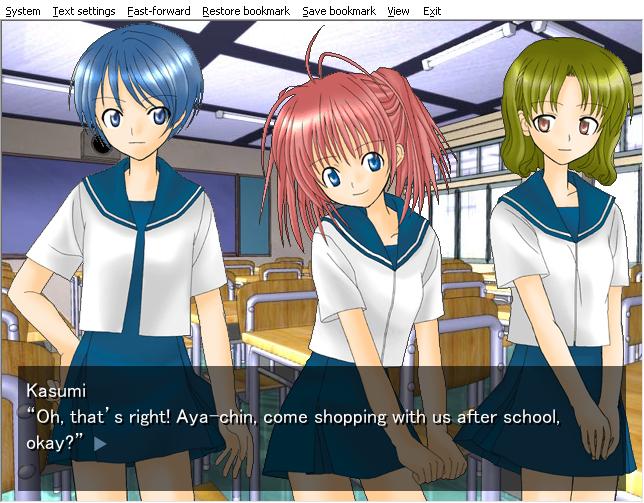

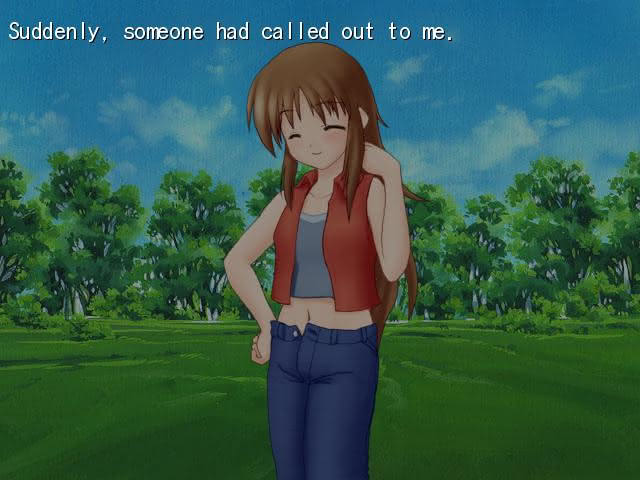
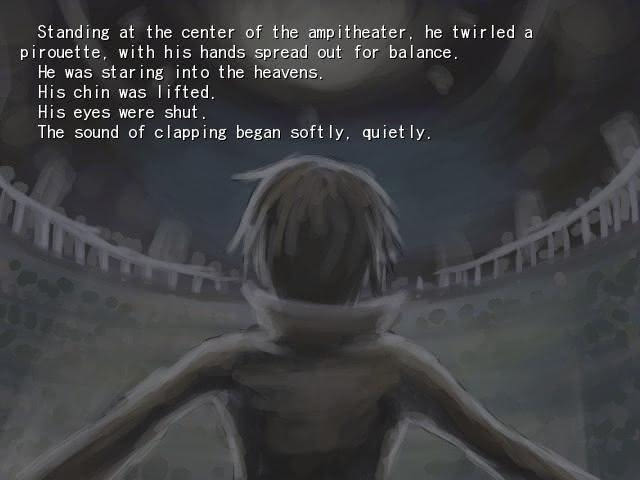


![Two girls, one older girl in a sailor uniform and a younger girl at a coat, sit at a kotatsu in an igloo in io [Christmas Eve]](https://thenewleafjournal.com/wp-content/uploads/2022/12/ioce-clean-kotatsu-cg.jpg)
